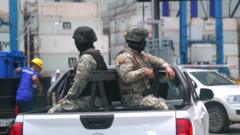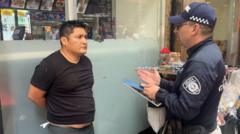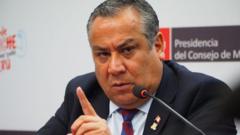The expansion of the Albanian mafia in Ecuador has resulted in the country becoming a major hub for cocaine trafficking to Europe, despite its lack of domestic production. With growing consumption in Europe and increased gang violence, local citizens are caught in a perilous cycle of crime and fear.
The Rise of Ecuador as a Cocaine Export Hub: A Dangerous Nexus

The Rise of Ecuador as a Cocaine Export Hub: A Dangerous Nexus
Uncover the alarming growth of Ecuador's role in the global cocaine trade, as European demand fuels violence and recruitment.
Ecuador has found itself at the heart of the burgeoning cocaine trade to Europe, primarily fueled by the expanding influence of the Albanian mafia. The alarming rise in drug trafficking highlights a complex web of violence, corruption, and economic vulnerability.
César, a pseudonymous member of the Latin Kings gang in Ecuador, reveals the harsh reality of his involvement with the Albanian drug traffickers. Through coercion and threats, he became embedded in their operations, which control a significant share of the cocaine flow from South America to Europe. Despite the country not producing cocaine, 70% of the world's supply is now funneled through its ports, according to Ecuadorean President Daniel Noboa.
The drugs arrive from Colombia and Peru, the world's leading producers, and are syruped in strategically located warehouses, waiting to be shipped abroad in cargo containers masked as legal exports like bananas. Ecuador, a country characterized by its scenic landscapes, is ironically now the world's largest cocaine exporter.
Last year set a disheartening new record, with police seizing nearly 300 tonnes of drugs. Major Christian Cozar Cueva of the National Police noted a 30% uptick in cocaine seizures bound for Europe, escalating the dangers for those entwined in this supply chain. Ordinary citizens, truck drivers such as Juan, now find themselves at risk of being caught up in these operations—unwittingly or otherwise.
The Albanian mafia’s growing presence isn't accidental; it exploits Ecuador's economic fragility following the pandemic, capitalizing on citizens' desperate circumstances to recruit them into the drug trade. Meanwhile, the perception of a banana export boom has drawn attention to a dark underbelly, with many fruit companies being mere covers for illicit activities.
The dire situation is compounded by the unyielding European demand for cocaine. With the UK's cocaine usage ranking among the highest globally, Ecuadorian authorities and reporters stress that consumer countries must take responsibility for the violence stemming from their cravings.
Ecuador’s President has reacted by mobilizing the military against gangs and marking drug trafficking as a priority for his presidency. He implores that while individuals may indulge in recreational drug use, the consequences ripple through to countless lives lost and communities devastated.
As the chain linking the Colombian and Peruvian fields to European streets tightens, Ecuador's message to the world is clear: addressing demand in consumer nations is crucial in stemming the tide of drug-related violence back home.
César, a pseudonymous member of the Latin Kings gang in Ecuador, reveals the harsh reality of his involvement with the Albanian drug traffickers. Through coercion and threats, he became embedded in their operations, which control a significant share of the cocaine flow from South America to Europe. Despite the country not producing cocaine, 70% of the world's supply is now funneled through its ports, according to Ecuadorean President Daniel Noboa.
The drugs arrive from Colombia and Peru, the world's leading producers, and are syruped in strategically located warehouses, waiting to be shipped abroad in cargo containers masked as legal exports like bananas. Ecuador, a country characterized by its scenic landscapes, is ironically now the world's largest cocaine exporter.
Last year set a disheartening new record, with police seizing nearly 300 tonnes of drugs. Major Christian Cozar Cueva of the National Police noted a 30% uptick in cocaine seizures bound for Europe, escalating the dangers for those entwined in this supply chain. Ordinary citizens, truck drivers such as Juan, now find themselves at risk of being caught up in these operations—unwittingly or otherwise.
The Albanian mafia’s growing presence isn't accidental; it exploits Ecuador's economic fragility following the pandemic, capitalizing on citizens' desperate circumstances to recruit them into the drug trade. Meanwhile, the perception of a banana export boom has drawn attention to a dark underbelly, with many fruit companies being mere covers for illicit activities.
The dire situation is compounded by the unyielding European demand for cocaine. With the UK's cocaine usage ranking among the highest globally, Ecuadorian authorities and reporters stress that consumer countries must take responsibility for the violence stemming from their cravings.
Ecuador’s President has reacted by mobilizing the military against gangs and marking drug trafficking as a priority for his presidency. He implores that while individuals may indulge in recreational drug use, the consequences ripple through to countless lives lost and communities devastated.
As the chain linking the Colombian and Peruvian fields to European streets tightens, Ecuador's message to the world is clear: addressing demand in consumer nations is crucial in stemming the tide of drug-related violence back home.





















